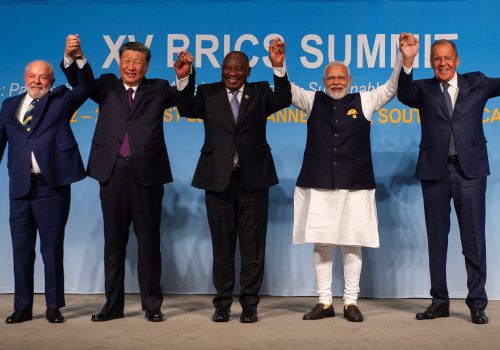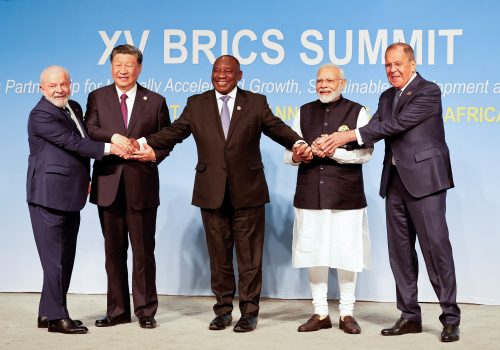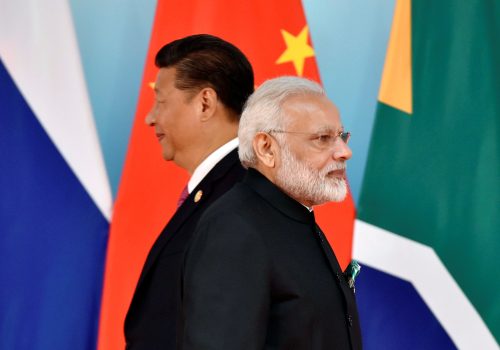The BRICS come to the Middle East and North Africa
At the recently concluded BRICS (Brazil, Russia, India, Chia, and South Africa) summit that took place in Johannesburg August 22-24, 2023, six additional countries were admitted, four of which are Middle Eastern countries: Egypt, Iran, Saudi Arabia, and the United Arab Emirates (UAE). The Middle East and North Africa (MENA) has thus gone from having no representation in the BRICS grouping of five states to having four members in the expanded group of eleven—including Argentina and Ethiopia—beginning in January 2024.
It is unclear whether the acronym BRICS will be expanded to include other letters (an A, two Es, another I, an S, and a U), or whether it will continue to be known as BRICS or perhaps BRICS+. Obviously, though, MENA concerns and voices appear set to play a more predominant role in future summits.
But while four MENA countries have gained admission to BRICS, there were other MENA governments whose hopes were disappointed: Algeria, Bahrain, Sudan, Syria, and Turkey—all of which reportedly sought admission. Given Algeria’s importance as a gas exporter and Turkey’s growing role as a regional power in its neighborhood and beyond, both would appear to have been more viable candidates for admission to BRICS than conflict-ridden Ethiopia. Perhaps, though, admitting any more than four new members when only one each from sub-Saharan Africa and Latin America (and no other region) would have seemed unbalanced to the existing BRICS leaders.
Presuming that unanimity will remain necessary for the admission of yet more members to BRICS, the four MENA members will all clearly need to be on board regarding any future expansion. If the recently improved relationship between Iran on the one hand and Saudi Arabia and the UAE on the other can be sustained, then their combined agreement could persuade other BRICS members about the admission of additional MENA states in particular. But if Iranian-Saudi and/or Iranian-Emirati relations relapse to their accustomed hostile state, then they might not be able to agree on any new MENA members—and other BRICS members may be unable to persuade them to relent.
However, expanding the membership of the BRICS will not be the only item on the agenda for old and new members. The most basic function of BRICS up to now has been to serve as a talking forum for important non-Western governments, just as the G-7 is a vital talking forum for important Western governments. Egypt, Iran, Saudi Arabia, and the UAE all have authoritarian governments that will join with Russia and China in opposing Western criticisms—such as they have been—about their human rights and democratic deficits.
The BRICS have also taken on an economic development mandate with various schemes for lending money to and investing in one another’s as well as other developing economies. So far, though, the money for these schemes has come mainly from China. The economies of Brazil, Russia, and South Africa all stagnated during the 2010s. They are all in need of funds and are not really in a position to provide them. The addition of Saudi Arabia and the UAE to the BRICS, though, could herald an influx of funds from them for BRICS development activity. Neither Egypt with its chronic economic problems nor heavily sanctioned Iran with its appears to be in a position to add much to this effort but are more likely to seek funds instead. Whether Saudi Arabia and the UAE will be willing to provide much funding to Iran, though, appears doubtful. Naturally, if their relations with Tehran sour, they won’t provide any.
This is because whatever purposes the BRICS serves—whether as a group of five or eleven—it does not seem likely to be able to resolve disputes among its members. Despite their common membership in BRICS (as well as the Shanghai Cooperation Organization), China and India remain at odds over their common border as well as China’s ties to Pakistan and India’s ties to the United States and the West. Similarly, their common membership in BRICS seems unlikely to help Tehran on the one hand and Riyadh and Abu Dhabi on the other to resolve theirs. Moscow, Beijing, and New Delhi are not going to want to choose sides after they have joined BRICS than they were beforehand.
Similarly, BRICS is not a collective security pact against outside threats. The rhetoric emanating from BRICS summits is often anti-Western—especially from Russian and Chinese officials who recently urged the BRICS to act as an anti-Western bloc—but the members are not committed to defending one another. Indeed, it is interesting to note that while one of the new MENA members—Iran—is strongly at odds with the West, Egypt, Saudi Arabia, and the UAE continue to engage in extensive security cooperation with the US despite some important differences with it.
For Egypt, Saudi Arabia, and the UAE in particular, joining BRICS is a statement that while they cooperate with the United States and the West, they also cooperate with Russia and China and that the West will just have to accept this. Perhaps their engaging in the BRICS may actually benefit the US and the West. While the BRICS has always distinguished itself from the West, the addition of the three Arab countries to its ranks strengthens the voices of existing members Brazil, India, and, to a lesser extent, South Africa, in arguing to the more anti-Western members (Russia, China, and now Iran) that, for them, cooperating with the West in some areas is desirable. Perhaps they can at least prevent Moscow, Beijing, and Tehran from turning the BRICS into a group that is completely hostile to the West—and that is something that Western diplomacy should encourage.
Mark N. Katz is a nonresident senior fellow at the Atlantic Council and professor of government and politics at the George Mason University Schar School of Policy and Government.
Further reading
Thu, Aug 24, 2023
BRICS is doubling its membership. Is the bloc a new rival for the G7?
New Atlanticist By
Atlantic Council experts share their insights on what the addition of Argentina, Egypt, Ethiopia, Iran, the UAE, and Saudi Arabia to the group might mean.
Wed, Aug 23, 2023
Piece by piece, the BRICS really are building a multipolar world
AfricaSource By
Coming out of the Johannesburg summit, the BRICS group has the potential to accelerate the process of dedollarization and the transition to a multipolar world.
Tue, Aug 8, 2023
China and India are at odds over BRICS expansion
New Atlanticist By Hung Tran
Beijing and New Delhi have different ideas about how the group should move forward, as India’s disagreement with China’s push to rapidly expand the organization’s membership demonstrates.
Image: FILE PHOTO: President of Brazil Luiz Inacio Lula da Silva, President of China Xi Jinping, South African President Cyril Ramaphosa, Prime Minister of India Narendra Modi and Russia's Foreign Minister Sergei Lavrov pose for a BRICS family photo during the 2023 BRICS Summit at the Sandton Convention Centre in Johannesburg, South Africa, on August 23, 2023. GIANLUIGI GUERCIA/Pool via REUTERS/File Photo


